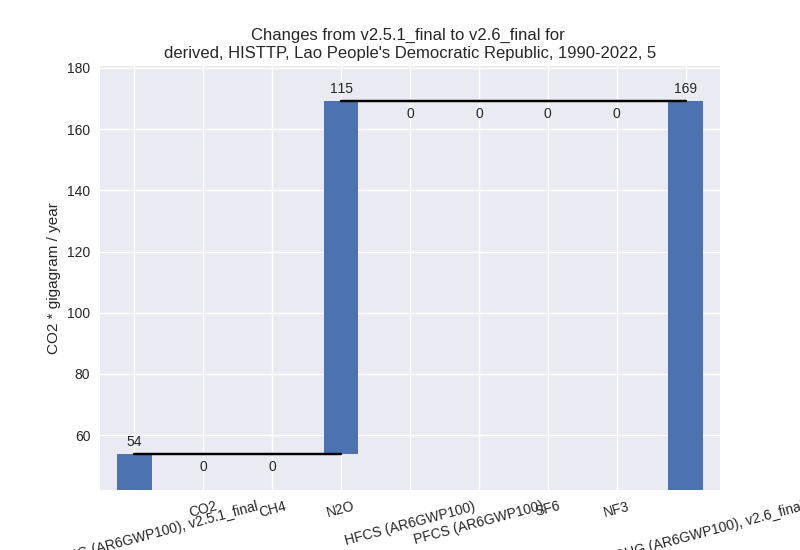Changes in PRIMAP-hist v2.6_final compared to v2.5.1_final for Lao People’s Democratic Republic
2024-09-24
Johannes Gütschow
Change analysis for Lao People’s Democratic Republic for PRIMAP-hist v2.6_final compared to v2.5.1_final
Overview over emissions by sector and gas
The following figures show the aggregate national total emissions excluding LULUCF AR6GWP100 for the country reported priority scenario. The dotted linesshow the v2.5.1_final data.
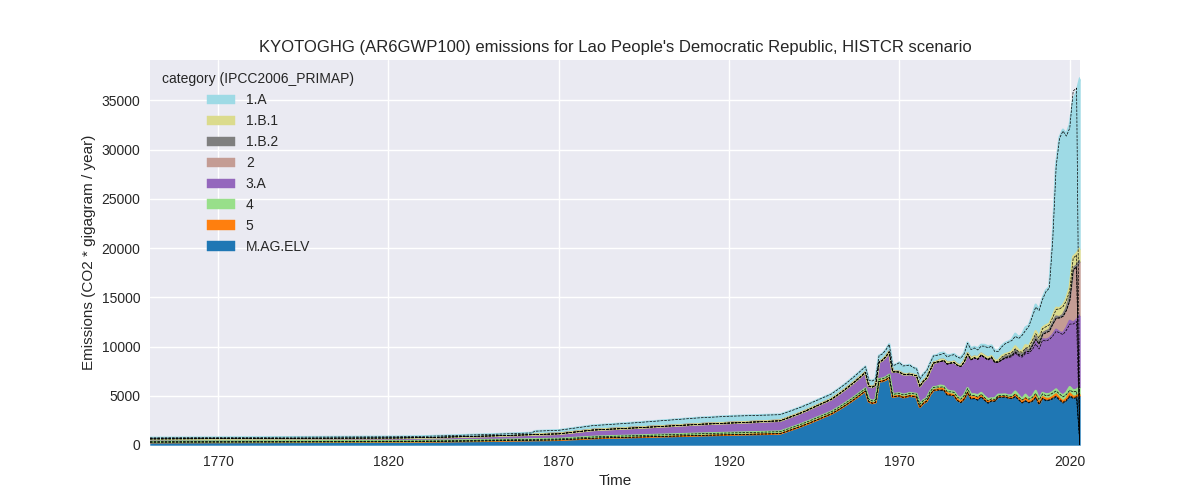
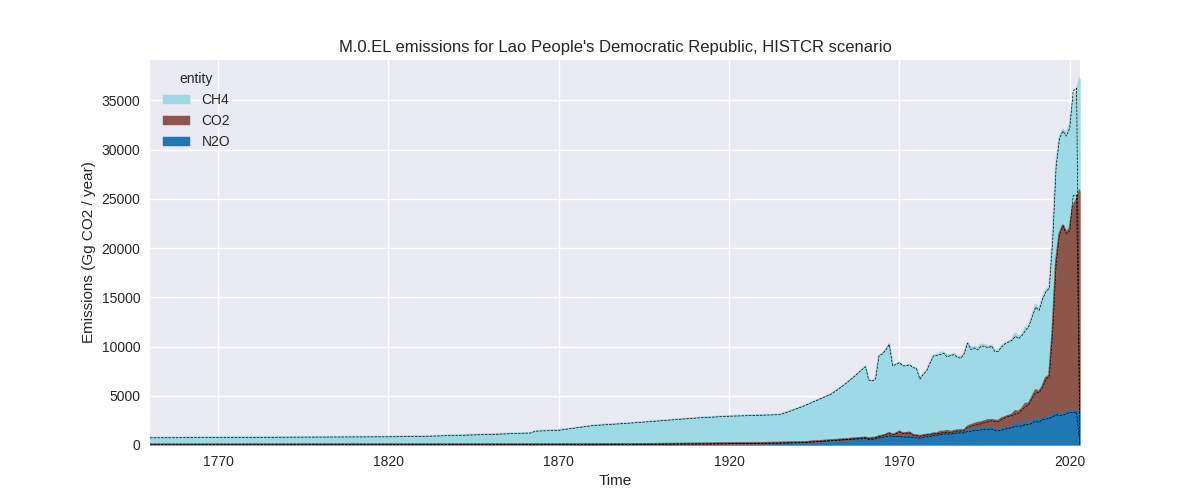
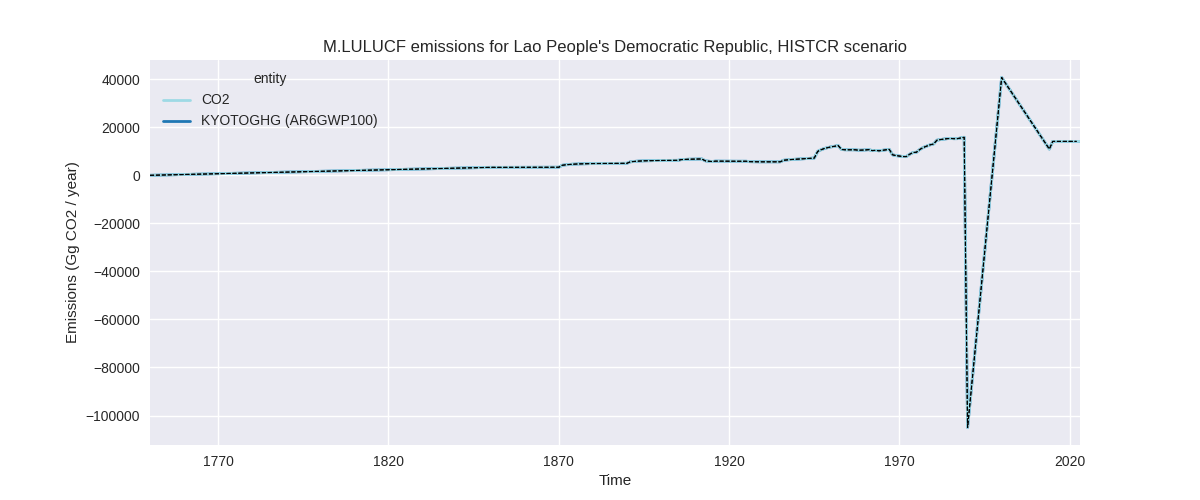
The following figures show the aggregate national total emissions excluding LULUCF AR6GWP100 for the third party priority scenario. The dotted linesshow the v2.5.1_final data.
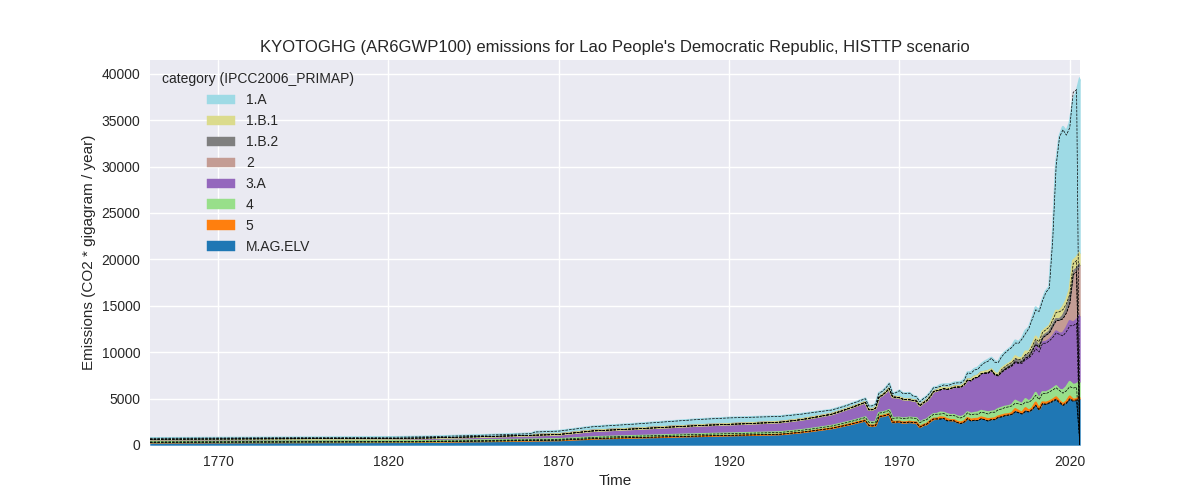
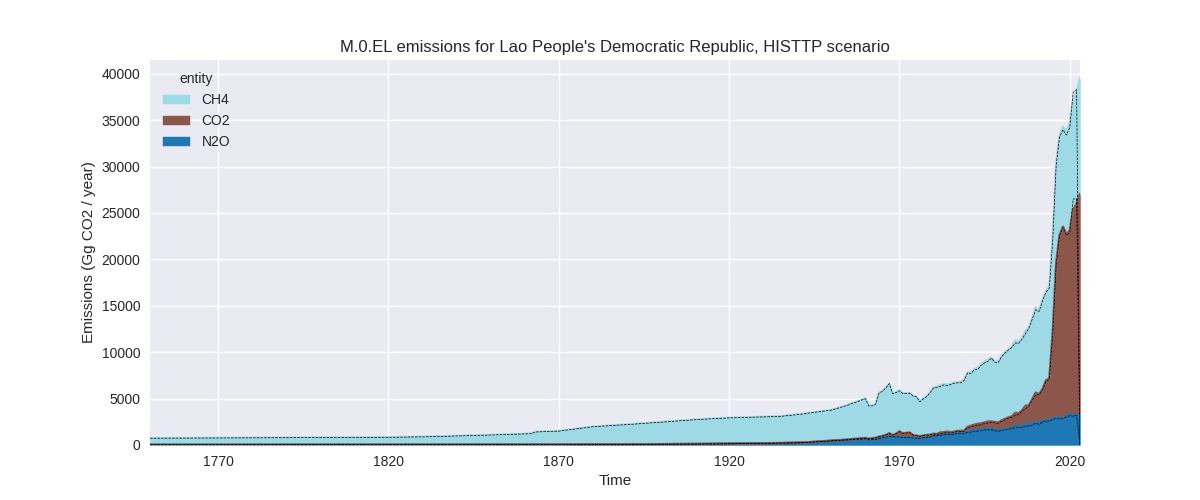
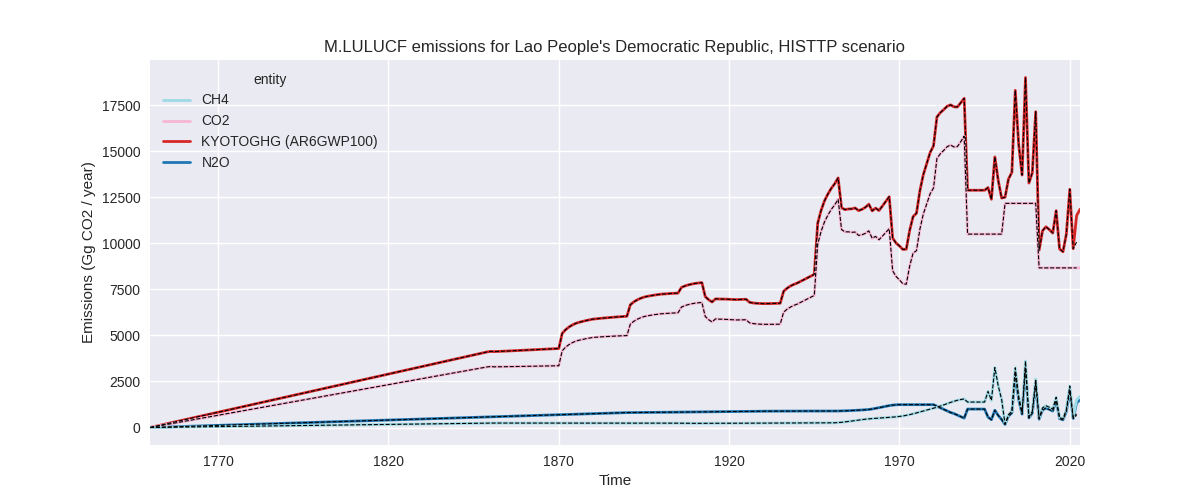
Overview over changes
In the country reported priority scenario we have the following changes for aggregate Kyoto GHG and national total emissions excluding LULUCF (M.0.EL):
- Emissions in 2022 have changed by -1.1%% (-411.06 Gg CO2 / year)
- Emissions in 1990-2022 have changed by 0.5%% (78.44 Gg CO2 / year)
In the third party priority scenario we have the following changes for aggregate Kyoto GHG and national total emissions excluding LULUCF (M.0.EL):
- Emissions in 2022 have changed by -0.7%% (-275.25 Gg CO2 / year)
- Emissions in 1990-2022 have changed by 0.6%% (101.30 Gg CO2 / year)
Most important changes per scenario and time frame
In the country reported priority scenario the following sector-gas combinations have the highest absolute impact on national total KyotoGHG (AR6GWP100) emissions in 2022 (top 5):
- 1: 1.A, CO2 with -552.51 Gg CO2 / year (-3.4%)
- 2: 4, CH4 with 101.17 Gg CO2 / year (22.2%)
- 3: 5, N2O with 51.48 Gg CO2 / year (54.7%)
- 4: 4, N2O with -11.45 Gg CO2 / year (-10.5%)
- 5: 4, CO2 with 0.25 Gg CO2 / year (1.7%)
In the country reported priority scenario the following sector-gas combinations have the highest absolute impact on national total KyotoGHG (AR6GWP100) emissions in 1990-2022 (top 5):
- 1: 5, N2O with 115.27 Gg CO2 / year (214.2%)
- 2: 1.A, CO2 with -49.83 Gg CO2 / year (-1.1%)
- 3: 4, CH4 with 14.45 Gg CO2 / year (5.4%)
- 4: 4, N2O with -1.47 Gg CO2 / year (-2.2%)
- 5: 4, CO2 with 0.03 Gg CO2 / year (0.3%)
In the third party priority scenario the following sector-gas combinations have the highest absolute impact on national total KyotoGHG (AR6GWP100) emissions in 2022 (top 5):
- 1: 1.A, CO2 with -597.46 Gg CO2 / year (-3.4%)
- 2: 4, CH4 with 281.92 Gg CO2 / year (23.0%)
- 3: 5, N2O with 51.48 Gg CO2 / year (54.7%)
- 4: 4, N2O with -11.45 Gg CO2 / year (-10.5%)
- 5: 4, CO2 with 0.25 Gg CO2 / year (1.7%)
In the third party priority scenario the following sector-gas combinations have the highest absolute impact on national total KyotoGHG (AR6GWP100) emissions in 1990-2022 (top 5):
- 1: 5, N2O with 115.27 Gg CO2 / year (214.2%)
- 2: 1.A, CO2 with -53.88 Gg CO2 / year (-1.1%)
- 3: 4, CH4 with 41.36 Gg CO2 / year (4.6%)
- 4: 4, N2O with -1.47 Gg CO2 / year (-2.2%)
- 5: 4, CO2 with 0.03 Gg CO2 / year (0.3%)
Notes on data changes
No country specific notes present for this changelog.
Changes by sector and gas
For each scenario and time frame the changes are displayed for all individual sectors and all individual gases. In the sector plot we use aggregate Kyoto GHGs in AR6GWP100. In the gas plot we usenational total emissions without LULUCF. ## country reported scenario
2022
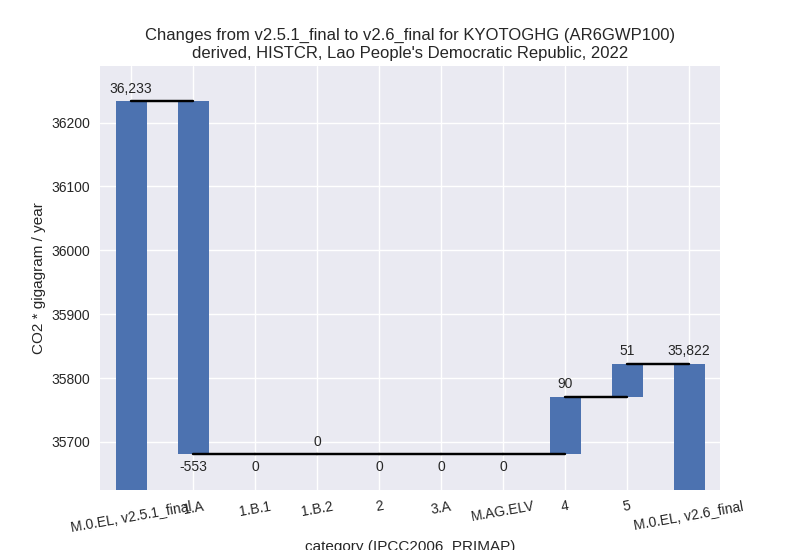
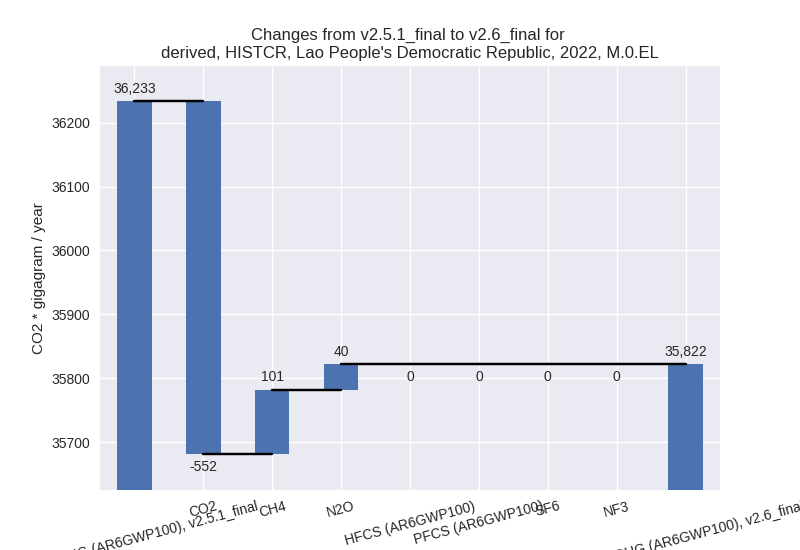
1990-2022
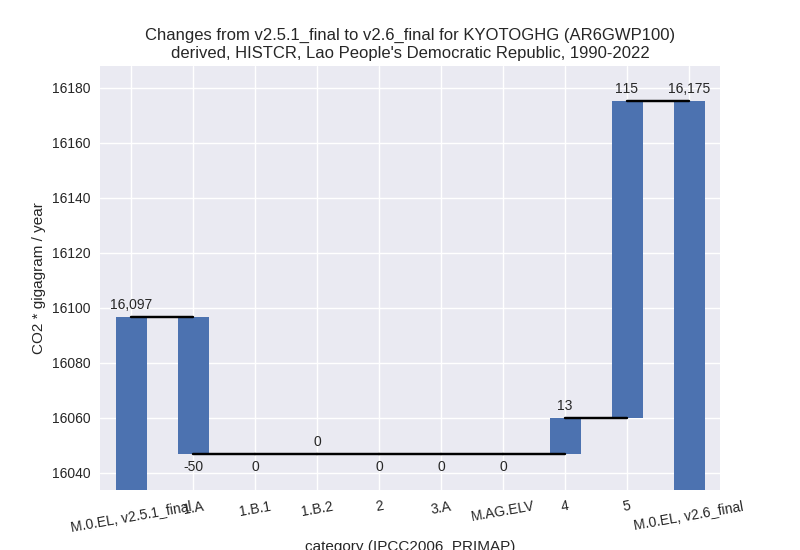
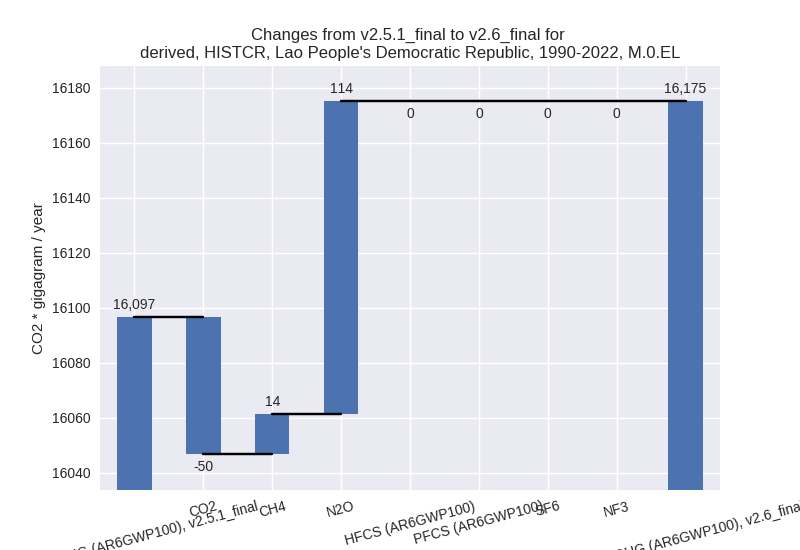
third party scenario
2022
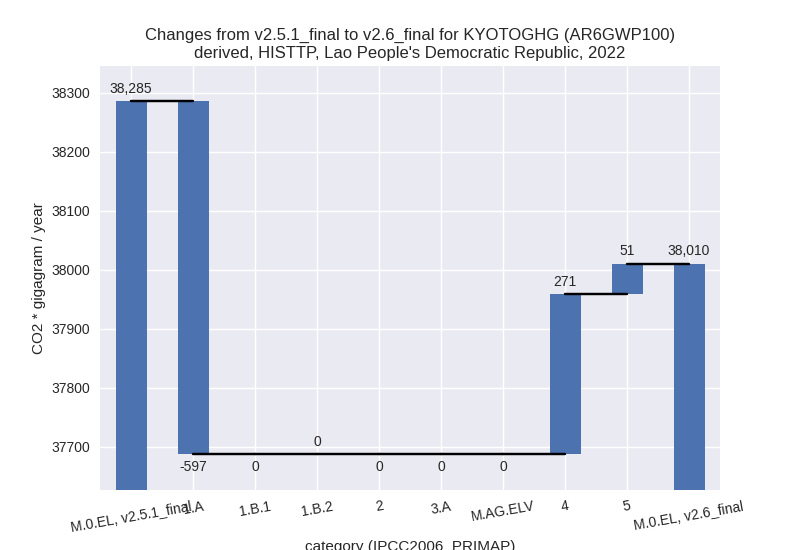
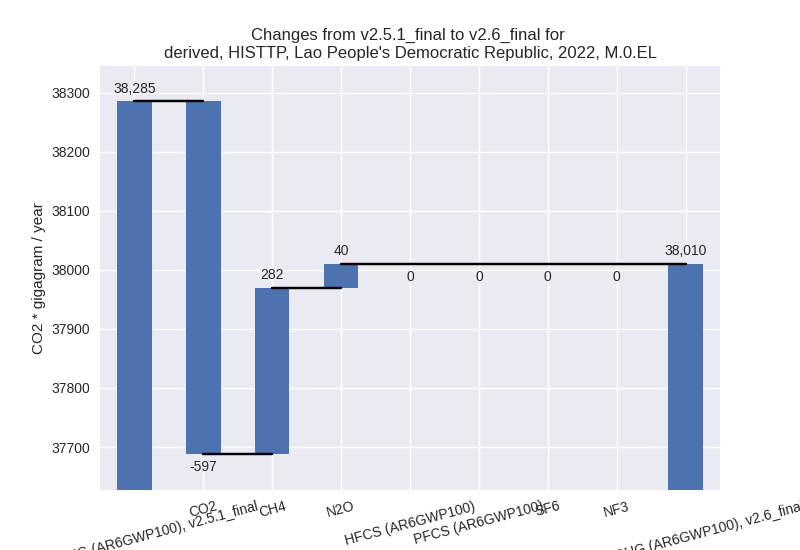
1990-2022
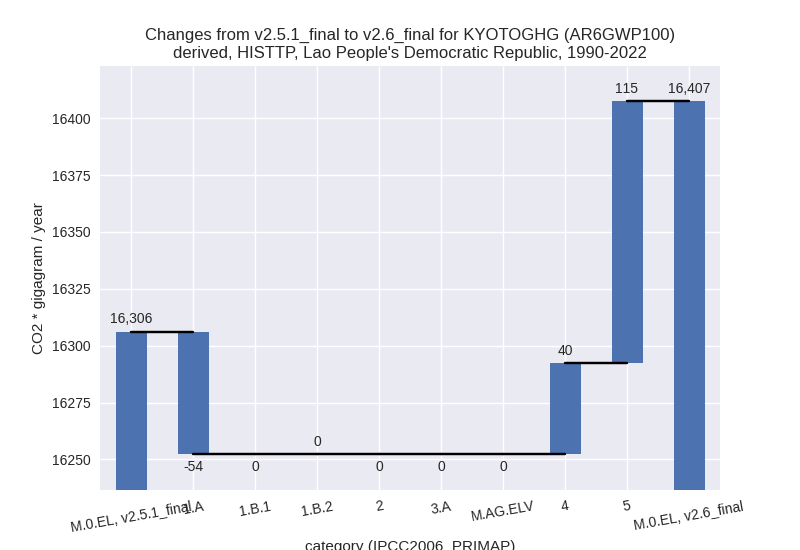
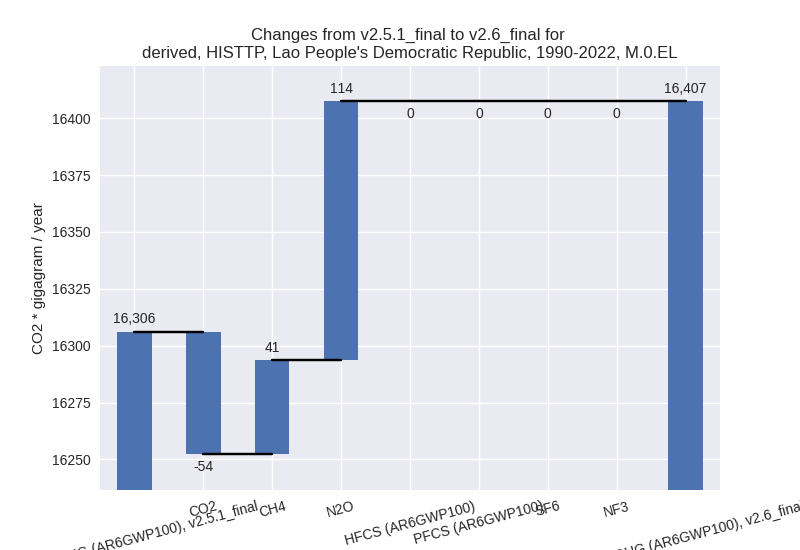
Detailed changes for the scenarios:
country reported scenario (HISTCR):
Most important changes per time frame
For 2022 the following sector-gas combinations have the highest absolute impact on national total KyotoGHG (AR6GWP100) emissions in 2022 (top 5):
- 1: 1.A, CO2 with -552.51 Gg CO2 / year (-3.4%)
- 2: 4, CH4 with 101.17 Gg CO2 / year (22.2%)
- 3: 5, N2O with 51.48 Gg CO2 / year (54.7%)
- 4: 4, N2O with -11.45 Gg CO2 / year (-10.5%)
- 5: 4, CO2 with 0.25 Gg CO2 / year (1.7%)
For 1990-2022 the following sector-gas combinations have the highest absolute impact on national total KyotoGHG (AR6GWP100) emissions in 1990-2022 (top 5):
- 1: 5, N2O with 115.27 Gg CO2 / year (214.2%)
- 2: 1.A, CO2 with -49.83 Gg CO2 / year (-1.1%)
- 3: 4, CH4 with 14.45 Gg CO2 / year (5.4%)
- 4: 4, N2O with -1.47 Gg CO2 / year (-2.2%)
- 5: 4, CO2 with 0.03 Gg CO2 / year (0.3%)
Changes in the main sectors for aggregate KyotoGHG (AR6GWP100) are
- 1: Total sectoral emissions in 2022 are 17621.14 Gg
CO2 / year which is 49.2% of M.0.EL emissions. 2022 Emissions have
changed by -3.0% (-552.51 Gg CO2 /
year). 1990-2022 Emissions have changed by -0.9% (-49.83 Gg CO2 / year). For 2022 the
changes per gas
are:
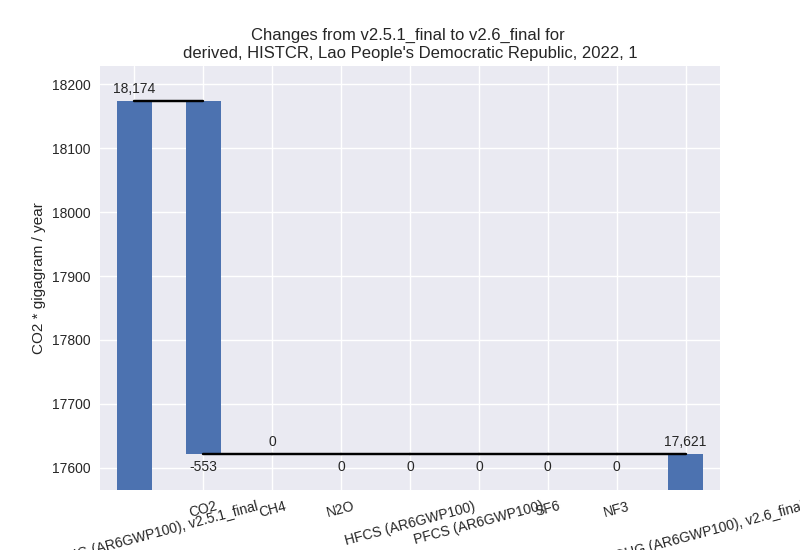
The changes come from the following subsectors:- 1.A: Total sectoral emissions in 2022 are 16394.35
Gg CO2 / year which is 93.0% of category 1 emissions. 2022 Emissions
have changed by -3.3% (-552.51 Gg
CO2 / year). 1990-2022 Emissions have changed by -1.0% (-49.83 Gg CO2 / year). For 2022 the
changes per gas
are:
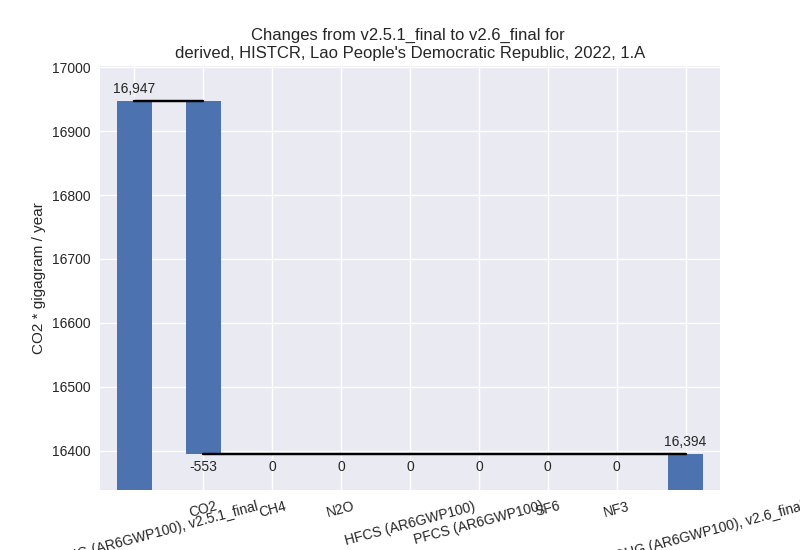
There is no subsector information available in PRIMAP-hist. - 1.B.1: Total sectoral emissions in 2022 are 1226.79 Gg CO2 / year which is 7.0% of category 1 emissions. 2022 Emissions have changed by 0.0% (0.00 Gg CO2 / year). 1990-2022 Emissions have changed by 0.0% (0.00 Gg CO2 / year).
- 1.B.2: Total sectoral emissions in 2022 are 0.00 Gg
CO2 / year which is 0.0% of category 1 emissions. 2022 Emissions have
changed by 62531.8% (0.00 Gg CO2 /
year). 1990-2022 Emissions have changed by 48904.0% (0.00 Gg CO2 / year). For 2022
the changes per gas
are:
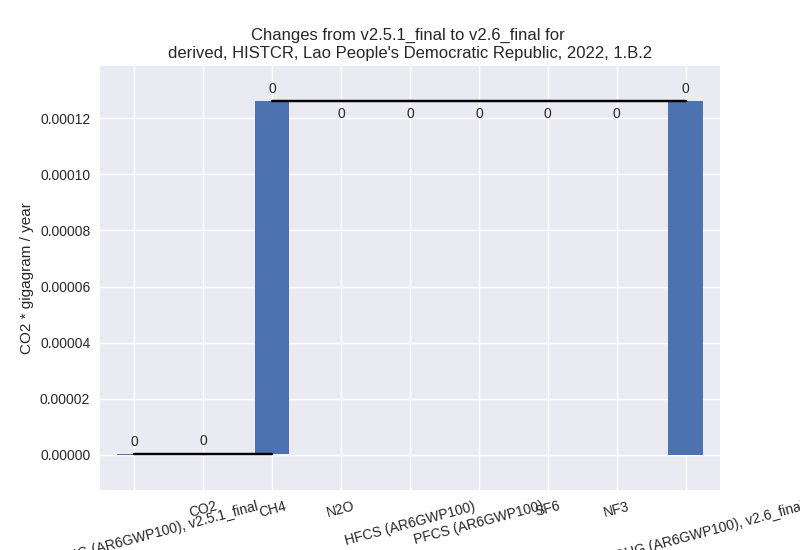
For 1990-2022 the changes per gas are: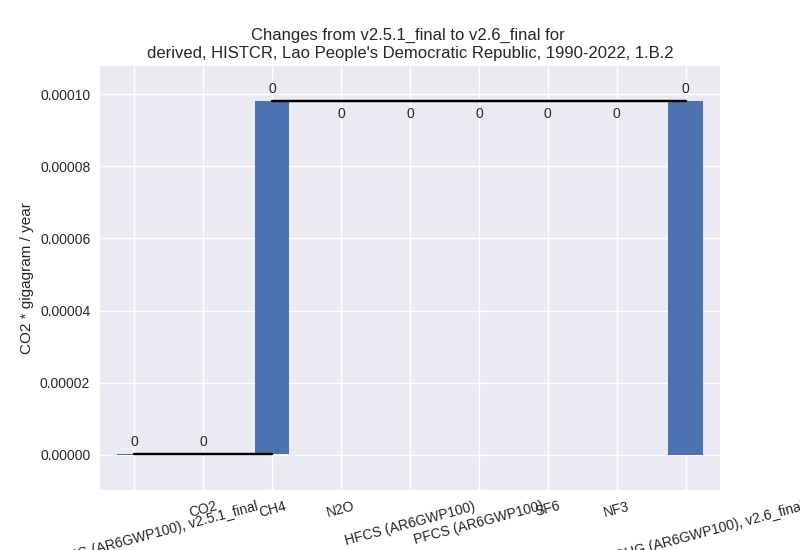
There is no subsector information available in PRIMAP-hist.
- 1.A: Total sectoral emissions in 2022 are 16394.35
Gg CO2 / year which is 93.0% of category 1 emissions. 2022 Emissions
have changed by -3.3% (-552.51 Gg
CO2 / year). 1990-2022 Emissions have changed by -1.0% (-49.83 Gg CO2 / year). For 2022 the
changes per gas
are:
- 2: Total sectoral emissions in 2022 are 5516.87 Gg CO2 / year which is 15.4% of M.0.EL emissions. 2022 Emissions have changed by 0.0% (0.00 Gg CO2 / year). 1990-2022 Emissions have changed by 0.0% (0.00 Gg CO2 / year).
- M.AG: Total sectoral emissions in 2022 are 11869.53 Gg CO2 / year which is 33.1% of M.0.EL emissions. 2022 Emissions have changed by 0.0% (0.00 Gg CO2 / year). 1990-2022 Emissions have changed by 0.0% (0.00 Gg CO2 / year).
- 4: Total sectoral emissions in 2022 are 669.16 Gg
CO2 / year which is 1.9% of M.0.EL emissions. 2022 Emissions have
changed by 15.5% (89.97 Gg CO2 /
year). 1990-2022 Emissions have changed by 3.8% (13.00 Gg CO2 / year). For 2022 the
changes per gas
are:
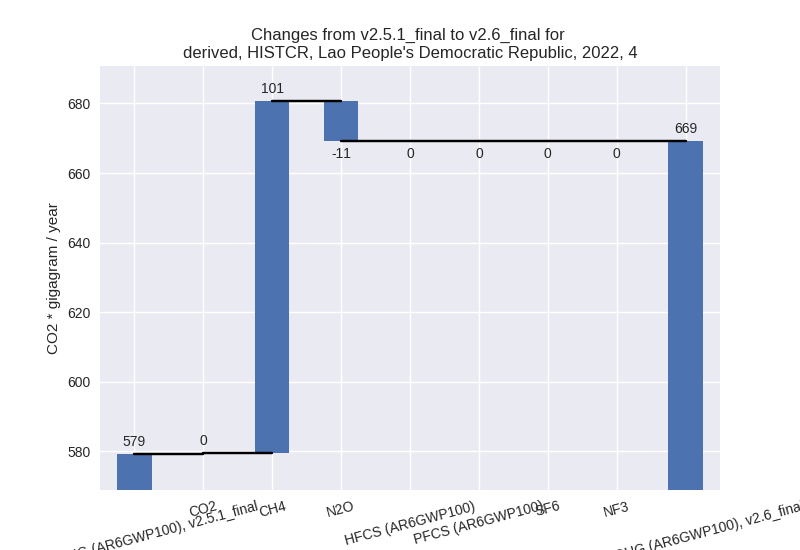
For 1990-2022 the changes per gas are: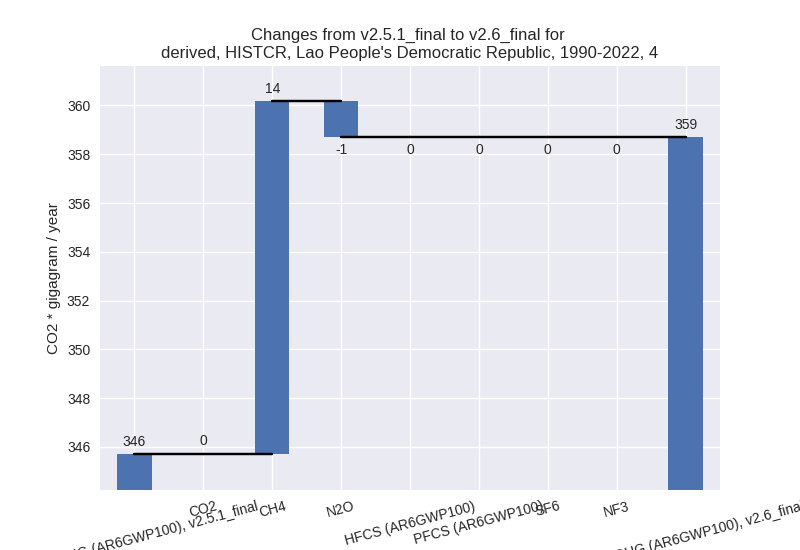
- 5: Total sectoral emissions in 2022 are 145.59 Gg
CO2 / year which is 0.4% of M.0.EL emissions. 2022 Emissions have
changed by 54.7% (51.48 Gg CO2 /
year). 1990-2022 Emissions have changed by 214.2% (115.27 Gg CO2 / year). For 2022
the changes per gas
are:
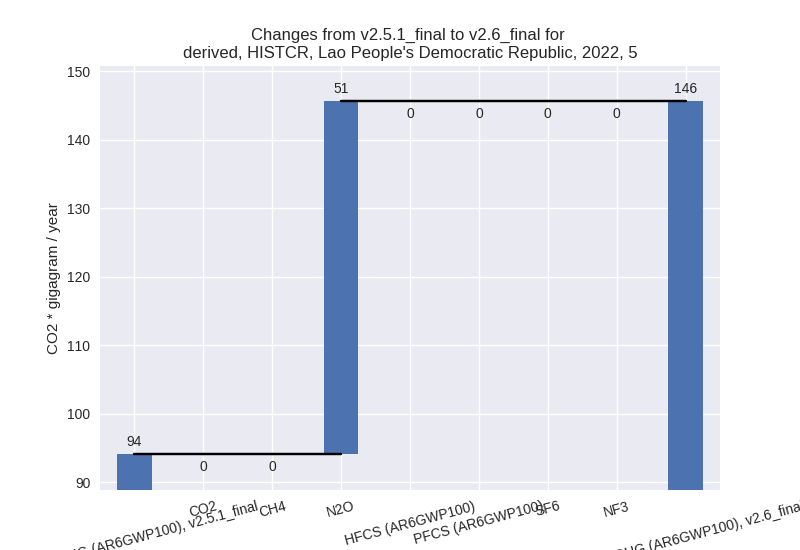
For 1990-2022 the changes per gas are: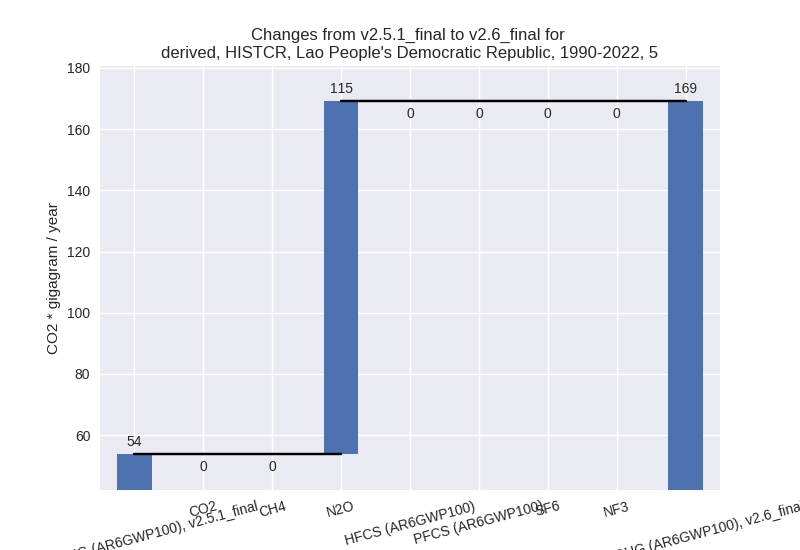
third party scenario (HISTTP):
Most important changes per time frame
For 2022 the following sector-gas combinations have the highest absolute impact on national total KyotoGHG (AR6GWP100) emissions in 2022 (top 5):
- 1: 1.A, CO2 with -597.46 Gg CO2 / year (-3.4%)
- 2: 4, CH4 with 281.92 Gg CO2 / year (23.0%)
- 3: 5, N2O with 51.48 Gg CO2 / year (54.7%)
- 4: 4, N2O with -11.45 Gg CO2 / year (-10.5%)
- 5: 4, CO2 with 0.25 Gg CO2 / year (1.7%)
For 1990-2022 the following sector-gas combinations have the highest absolute impact on national total KyotoGHG (AR6GWP100) emissions in 1990-2022 (top 5):
- 1: 5, N2O with 115.27 Gg CO2 / year (214.2%)
- 2: 1.A, CO2 with -53.88 Gg CO2 / year (-1.1%)
- 3: 4, CH4 with 41.36 Gg CO2 / year (4.6%)
- 4: 4, N2O with -1.47 Gg CO2 / year (-2.2%)
- 5: 4, CO2 with 0.03 Gg CO2 / year (0.3%)
Changes in the main sectors for aggregate KyotoGHG (AR6GWP100) are
- 1: Total sectoral emissions in 2022 are 19047.91 Gg
CO2 / year which is 50.1% of M.0.EL emissions. 2022 Emissions have
changed by -3.0% (-597.46 Gg CO2 /
year). 1990-2022 Emissions have changed by -0.9% (-53.88 Gg CO2 / year). For 2022 the
changes per gas
are:
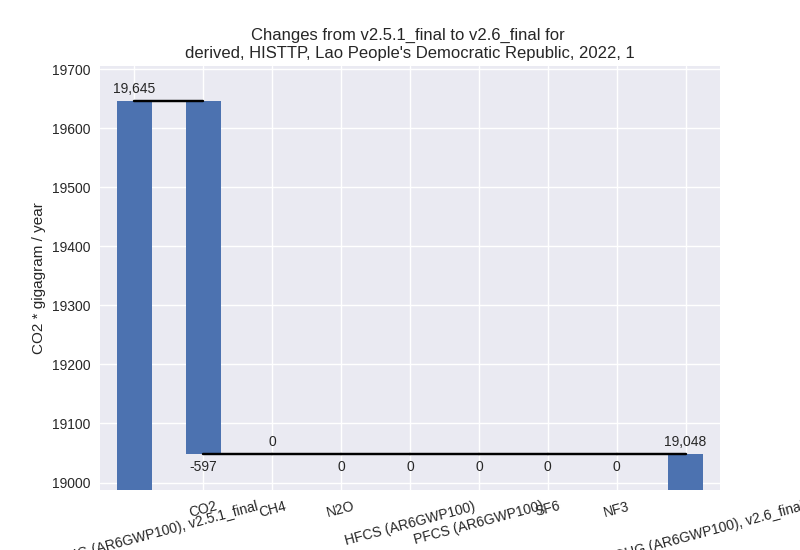
The changes come from the following subsectors:- 1.A: Total sectoral emissions in 2022 are 17821.12
Gg CO2 / year which is 93.6% of category 1 emissions. 2022 Emissions
have changed by -3.2% (-597.46 Gg
CO2 / year). 1990-2022 Emissions have changed by -1.0% (-53.88 Gg CO2 / year). For 2022 the
changes per gas
are:
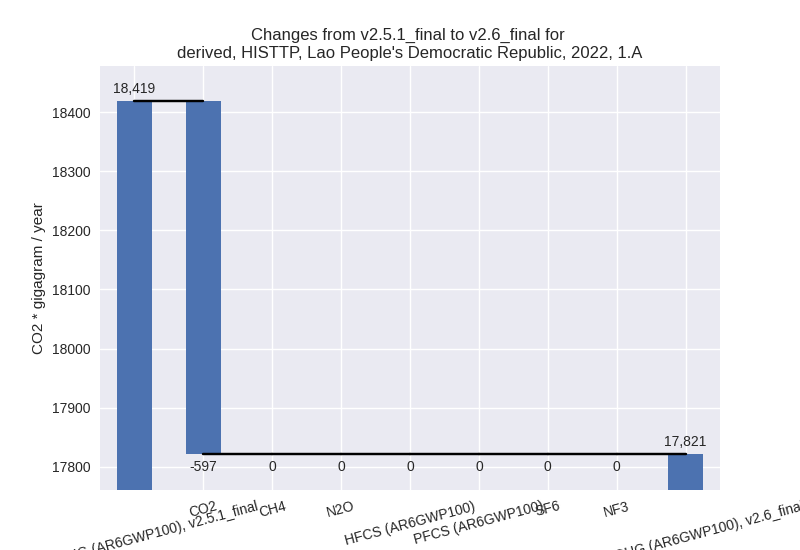
There is no subsector information available in PRIMAP-hist. - 1.B.1: Total sectoral emissions in 2022 are 1226.79 Gg CO2 / year which is 6.4% of category 1 emissions. 2022 Emissions have changed by 0.0% (0.00 Gg CO2 / year). 1990-2022 Emissions have changed by 0.0% (0.00 Gg CO2 / year).
- 1.B.2: Total sectoral emissions in 2022 are 0.00 Gg
CO2 / year which is 0.0% of category 1 emissions. 2022 Emissions have
changed by 62531.8% (0.00 Gg CO2 /
year). 1990-2022 Emissions have changed by 48904.0% (0.00 Gg CO2 / year). For 2022
the changes per gas
are:
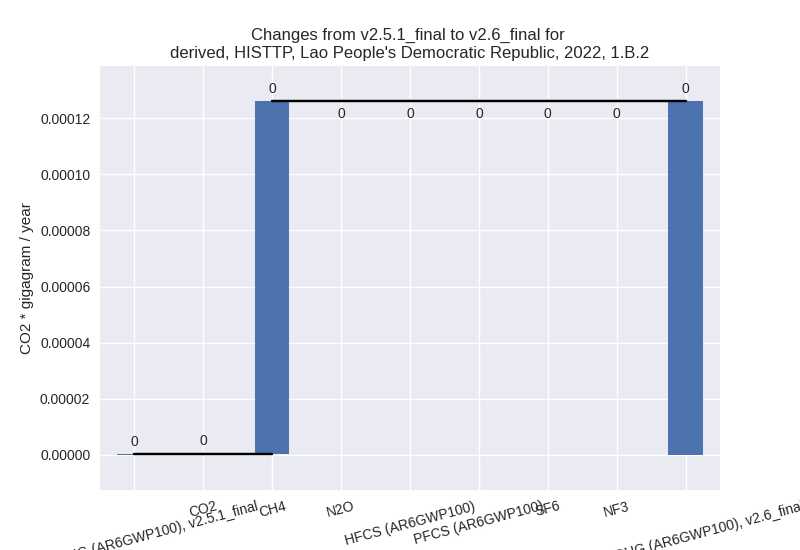
For 1990-2022 the changes per gas are: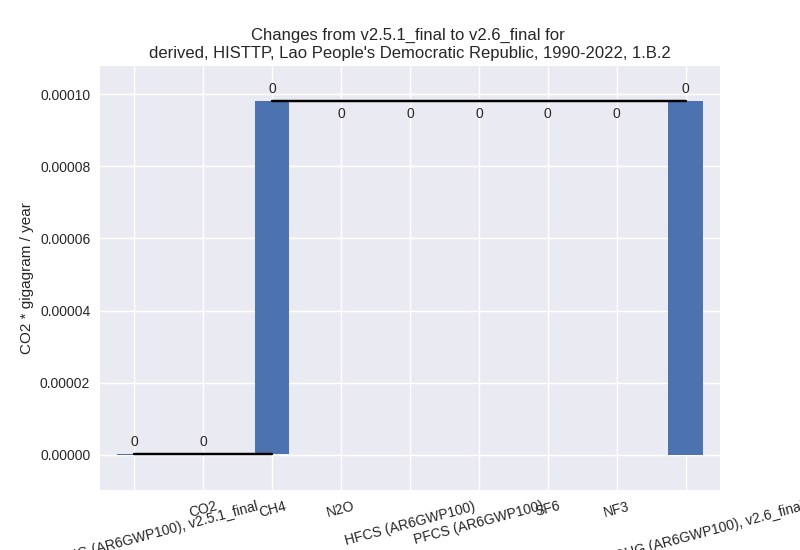
There is no subsector information available in PRIMAP-hist.
- 1.A: Total sectoral emissions in 2022 are 17821.12
Gg CO2 / year which is 93.6% of category 1 emissions. 2022 Emissions
have changed by -3.2% (-597.46 Gg
CO2 / year). 1990-2022 Emissions have changed by -1.0% (-53.88 Gg CO2 / year). For 2022 the
changes per gas
are:
- 2: Total sectoral emissions in 2022 are 5516.87 Gg CO2 / year which is 14.5% of M.0.EL emissions. 2022 Emissions have changed by 0.0% (0.00 Gg CO2 / year). 1990-2022 Emissions have changed by 0.0% (0.00 Gg CO2 / year).
- M.AG: Total sectoral emissions in 2022 are 11680.97 Gg CO2 / year which is 30.7% of M.0.EL emissions. 2022 Emissions have changed by 0.0% (0.00 Gg CO2 / year). 1990-2022 Emissions have changed by 0.0% (0.00 Gg CO2 / year).
- 4: Total sectoral emissions in 2022 are 1618.57 Gg
CO2 / year which is 4.3% of M.0.EL emissions. 2022 Emissions have
changed by 20.1% (270.72 Gg CO2 /
year). 1990-2022 Emissions have changed by 4.1% (39.91 Gg CO2 / year). For 2022 the
changes per gas
are:
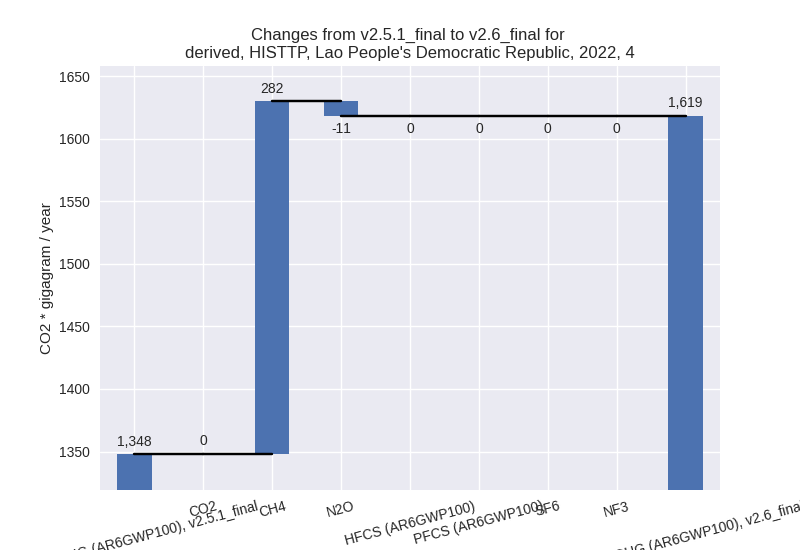
For 1990-2022 the changes per gas are: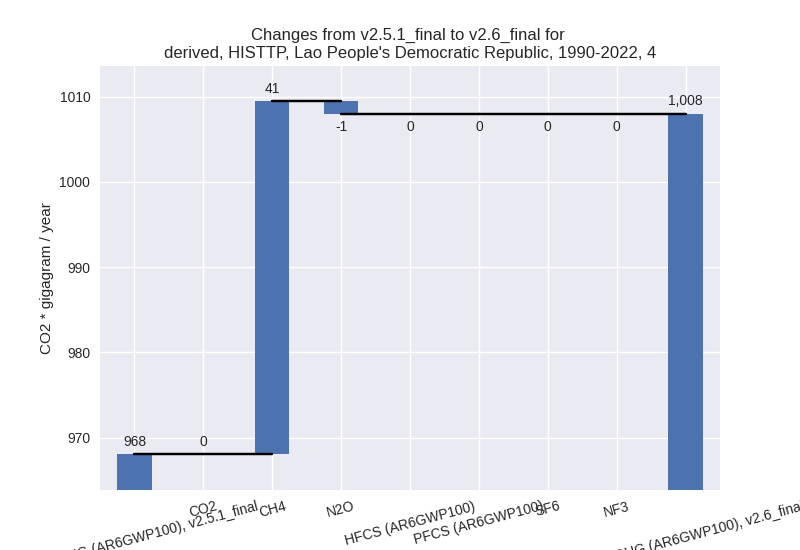
- 5: Total sectoral emissions in 2022 are 145.59 Gg
CO2 / year which is 0.4% of M.0.EL emissions. 2022 Emissions have
changed by 54.7% (51.48 Gg CO2 /
year). 1990-2022 Emissions have changed by 214.2% (115.27 Gg CO2 / year). For 2022
the changes per gas
are:
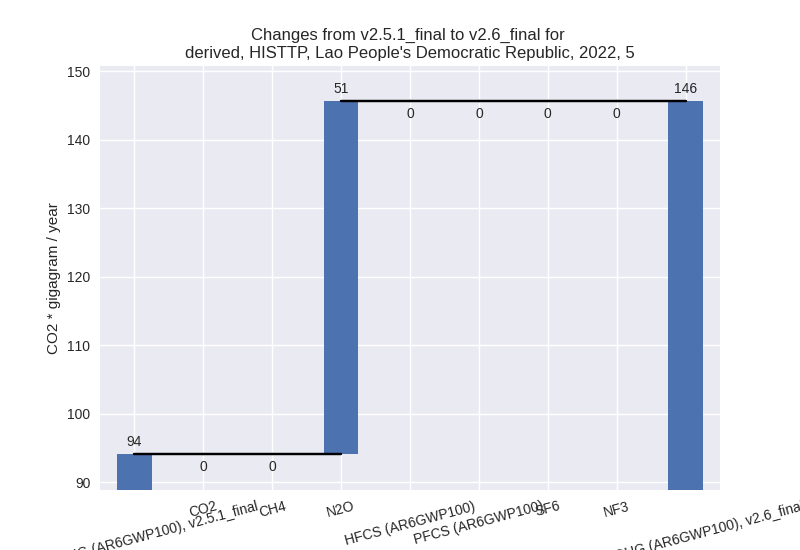
For 1990-2022 the changes per gas are: